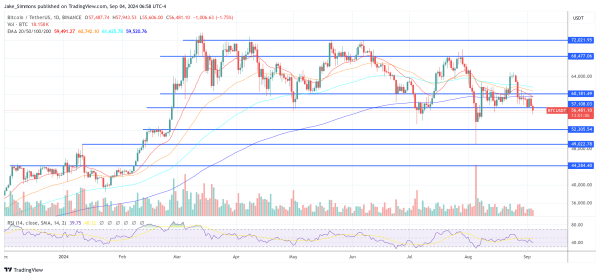Over the past seven months, the price of Bitcoin has moved in a range between $73,777 and $49,000, significantly depressing sentiment across the market. In a new analysis published via X, Will Clemente III, co-founder of Reflexivity Research, addresses the prevailing sentiment of impatience and uncertainty among investors, sharing why he still remains bullish.
Clemente’s bullish sentiment draws from a long-term perspective over the next decade. Drawing upon his expertise in portfolio construction and asset allocation, Clemente emphasized the importance of identifying major economic trends likely to unfold over the next decade. “Been thinking a lot about portfolio construction lately and position sizing. I keep coming back to there’s nothing I’d rather go into a coma for 10 years and hold than Bitcoin,” Clemente stated, emphasizing his confidence in Bitcoin as the superior long-term asset.
His analysis is grounded in the anticipation of certain macroeconomic trends. Clemente suggests that investors should consider what the biggest trends are likely to be over the next decade and adjust their portfolio accordingly. This involves either significantly increasing investment in the highest confidence trend or spreading investments across several promising trends based on their potential impact.
He personally favors focusing on the most probable trend, which he identifies as the ongoing growth of the US deficit and the subsequent need for the government to debase the currency to service this debt. This scenario, according to Clemente, offers a more predictable outcome than other technological trends like AI or space exploration.
“Compared to other technological trends, the debasement one is pure math. In addition, the way to bet on other technological trends, for example AI or space, isn’t as clear as debasement, given there’s not a way to position for it as clear as Bitcoin,” Clemente writes.
How High Can Bitcoin Go In 10 Years?
Clemente’s bullish stance on Bitcoin is reinforced by his analysis of potential capital inflows from sovereign wealth and pension funds. He estimates that if these entities were to allocate just 1% of their capital to Bitcoin, it would result in approximately $460 billion of new investments into BTC, potentially doubling its market cap and driving prices to between $150,000 and $200,000 per Bitcoin.
He further speculates on the impact of an increased allocation, suggesting that if concerns over the deficit intensify, these institutions might allocate as much as 3%, translating into $1.4 trillion entering Bitcoin. And the upside potential is even larger. “What happens if it eats into the $10t-$15t of gold’s monetary premium? How about the combined monetary premium in treasuries/equities/real estate that’s currently parked into these assets as SoV to protect against currency debasement?” Clemente pondered.
Concluding his analysis, Clemente reasoned that a $1 million price per Bitcoin by 2034 is not out of the realm of possibility when factoring in the reduced purchasing power of the dollar. “Also would like to sprinkle on top that this is not factoring in dollars being worth significantly less in the future due to debasement, so $1mm BTC in 2034 is not as crazy as $1mm BTC in 2024,” the analyst remarked.
However, Clemente also acknowledged, “I do think Bitcoin’s days of 100%+ CAGR are gone, but that’s not to say it won’t outperform equity indices by a lot — and on a confidence-adjusted basis, I don’t see anything as compelling in the marketplace today.”
At press time, BTC traded at $56,481.

Featured image created with DALL.E, chart from TradingView.com
Source